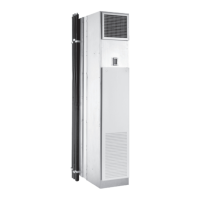Afterwards, all controls should be inspected regularly for
proper operation. Some components may experience
erratic operation or failure due to age. Wall thermostats
may also become clogged with dust and lint and should
be periodically inspected and cleaned to provide reliable
operation.
When replacing any components such as fuses, contractors,
or relays, use only the exact type, size and voltage
component as furnished from the factory. Any deviation
without factory authorization could result in personal
injury or damage to the unit. This will also void all factory
warranties. All repair work should be done in such a manner
as to maintain the equipment in compliance with governing
codes, ordinances and testing agency listings.
More specic information regarding the use and operating
characteristics of the standard controls oered by the
manufacturer are contained in other manuals.
Valves and Piping
No formal maintenance is required on the valve-package
components most commonly used with fan coil units other
than a visual inspection for possible leaks in the course of
other normal periodic maintenance. In the event that a
valve should need replacement, the same precautions taken
during the initial installation to protect the valve package
from excessive heat should also be used during replacement.
Filters, Throwaway
The type of throwaway lter most commonly used on fan coil
units should be replaced on a regular basis. The time interval
between each replacement should be established based
on regular inspection of the lter and should be recorded
in the log for each unit. Refer to the product catalog for the
recommended lter size for each product type and size. If
the replacement lters are not purchased from the factory,
the lters used should be the same type and size as those
furnished from or recommended by the factory. Pleated
media or extended surface lters should not be used since
the high air pressure drops encountered.
with these types of lters are not compatible with the type
of fan coil unit covered in this manual. Consult the factory for
applications using lter types other than the factory standard
or optional product.
Filters, Permanent
A maintenance schedule for permanent lters should be
developed in the same manner as throwaway lters. Unlike
throwaway lters, permanent lters may be cleaned and
re-installed in the unit instead of being discarded when dirty.
The optional factory permanent lter may be cleaned in hot
soapy water to remove any trapped dirt. It should then be set
aside on edge to dry.
Before replacing the lter in the unit, it should be recharged
with some type of entrapment lm such as “Film-Cor
Recharging Oil.” The lter should be sprayed on both sides
or submerged in the lm to assure complete coverage. The
lter should not be allowed to soak in the lm, but should
be immediately removed and the excess lm drained from
the lter before re-installation in the unit. Consult a local
lter supplier for types of available cleaning solutions and
charging lms.
It should be noted that permanent lters normally have less
static pressure loss than throwaway lters.
Drain
The drain should be checked before initial start-up and at the
beginning of each cooling season to assure that the drain
trap and riser are clear. If it is clogged, steps should be taken
to clear the debris so that condensate will ow easily.
Periodic checks of the drain should be made during the
cooling season to maintain a free-owing condensate.
Should the growth of algae and/or bacteria be a concern,
consult an air conditioning and refrigeration supply
organization familiar with local conditions for chemicals or
other solutions available to control these agents.
23

